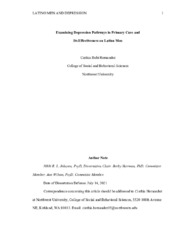Examining Depression Pathways in Primary Care and Its Effectiveness on Latino Men
Abstract
This study reviewed data from primary care clinics in the state of Washington in which the primary care behavioral health model was practiced to examine depression pathways used to improve depression care among Latino men and to highlight differences between Latino men and non-Latino White men. Further, treatment interventions for depression were reviewed to assess psychotherapy, medication and combined treatments to verify their effectiveness by tracking changes in the Patient Health Questionnaire-9 over time. The hypotheses posit (a) Latino males in clinic would engage with behavioral health less than their non-Latino counterparts, (b) Latino men would have lower rates of mediation adherence compared to non-Latino White males, (c) Latino men engaged in the depression pathway would endorse symptom reduction at a faster rate than non-Latino White males, and (d) Latino men would have more visits to behavioral health compared to the nation average for men. There were no significant findings between groups in the number of visits and symptom reduction practices. There was a significant difference found when Latino males in this group were compared to the national average number of visits for Latinos. There was also a significant difference found suggesting the studied depression clinical pathway was effective for males represented in this study.
Original item type
PDF
Original extent
74 pages
Collections
Copyright
This original work is protected by copyright. Copyright is retained by the author(s). Works may be viewed, downloaded, or printed, but not reproduced or distributed without author(s) permission.


 Maintained by the Northwest University Library
Maintained by the Northwest University Library